
The Brazil national football team, nicknamed Seleção Canarinho, represents Brazil in men's international football and is administered by the Brazilian Football Confederation (CBF), the governing body for football in Brazil. They have been a member of FIFA since 1923 and a member of CONMEBOL since 1916.

Club de Regatas Vasco da Gama, commonly referred to as Vasco da Gama or simply Vasco, is a sports club based in Rio de Janeiro, Brazil. Although originally a rowing club and then a multi-sport club, Vasco is mostly known for its men's football team, which currently competes in the Campeonato Brasileiro Série A, the top tier of the Brazilian football league system, and in the Campeonato Carioca, the state of Rio de Janeiro's premier state league.
The FIFA Club World Cup is an international men's association football competition organised by the Fédération Internationale de Football Association (FIFA), the sport's global governing body. The competition was first contested in 2000 as the FIFA Club World Championship. It was not held from 2001 to 2004 due to a combination of factors in the cancelled 2001 tournament, most importantly the collapse of FIFA's marketing partner International Sport and Leisure (ISL), but in 2005 it changed to an annual competition through 2023. Following the 2023 edition, the tournament was revamped to a quadrennial competition starting in 2025. Views differ as to the cup's prestige: it struggles to attract interest in most of Europe, and is the object of heated debate in South America.

Ricardo Izecson dos Santos Leite, commonly known as Kaká or Ricardo Kaká, is a Brazilian former professional footballer who played as an attacking midfielder. In his prime as a playmaker at AC Milan, where he was known for his passing, pace, goalscoring, and dribbling, Kaká was widely regarded as one of the greatest players of his generation. With success for both club and country, he is one of the nine players to win the FIFA World Cup, the UEFA Champions League, and the Ballon d'Or.

The Campeonato Brasileiro Série A, commonly referred to as the Brasileirão, the Série A or the Brazilian Série A, is a Brazilian professional league for men's football clubs. At the top of the Brazilian football league system, it is the country's primary football competition. Contested by 20 clubs, it operates on a system of promotion and relegation with the Campeonato Brasileiro Série B. In 2021, the competition was chosen by the IFFHS as the strongest national league in South America as well as the strongest in the world.

Thiago Emiliano da Silva is a Brazilian professional footballer who plays as a centre-back for and captains Campeonato Brasileiro Série A club Fluminense. Widely regarded as one of the best defenders of his generation, he is known for his defensive prowess, discipline, and leadership.

Willian Borges da Silva, known mononymously as Willian, is a Brazilian professional footballer who plays as a winger or attacking midfielder for Super League Greece club Olympiacos.
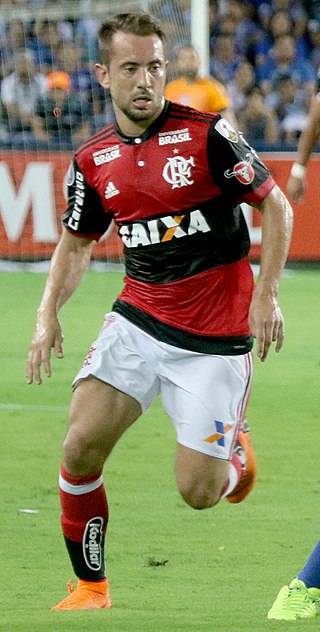
Éverton Augusto de Barros Ribeiro is a Brazilian professional footballer who plays as an attacking midfielder or winger for Campeonato Brasileiro Série A club Bahia.

Givanildo Vieira de Sousa, mononymously known as Hulk, is a Brazilian professional footballer who plays as a forward for Atlético Mineiro.

Neymar da Silva Santos Júnior, also known as Neymar Júnior or simply Neymar, is a Brazilian professional footballer who plays as a forward for Saudi Pro League club Al Hilal and the Brazil national team. Widely regarded as one of the best players of his generation, he is known for his skills, dribbling, playmaking, and finishing. Neymar is one of the few players to have scored at least 100 goals for three different clubs. He is the highest-scoring Brazilian in the UEFA Champions League and is also Brazil's all-time top goalscorer.
The Brazil national futsal team represents Brazil in international futsal competitions. It is under the direction of the Brazilian Football Confederation (CBF). The team is considered to be the strongest in the world earning a record three straight championships in the FIFA Futsal World Cup. Brazil also holds a record eleven championship wins in the South American Futsal Championship also known as the Copa América de Futsal and five wins in the Taça América de Futsal. As of Semptember 2024, Brazil is ranked first in the Futsal World Rankings. Brazil has played in all 10 FIFA Futsal World Cups and has finished in the top three nine times, reaching the finals seven times and winning six titles, which includes the recent Futsal World Cup in 2024. The team has the best overall performance in the World Cup competition both in proportional and absolute terms. As of 2024, Brazil has a winning record against every nation they have faced in their history, winning over 89% of the matches and losing 5% of them.
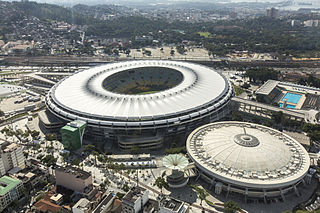
Association football is the most popular sport in almost all South American countries. There are a wide range of sports played in the continent of South America. Popular sports include rugby union, baseball, basketball, tennis, golf, volleyball, hockey, beach volleyball, motorsports and cricket. South America held its first Olympic Games in Rio de Janeiro, Brazil in 2016. Two years prior to this, major cities in Brazil hosted the 2014 FIFA World Cup.
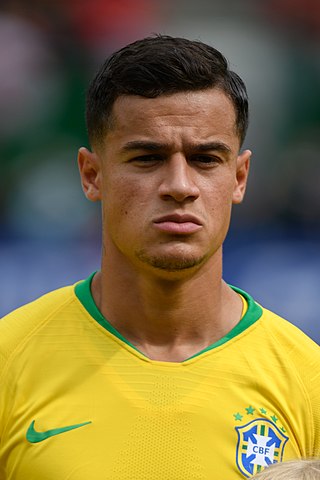
Philippe Coutinho Correia is a Brazilian professional footballer who plays as an attacking midfielder or winger for Campeonato Brasileiro Série A club Vasco da Gama, on loan from Premier League club Aston Villa. He is known for his combination of vision, passing, dribbling and ability to conjure curling long-range shots.
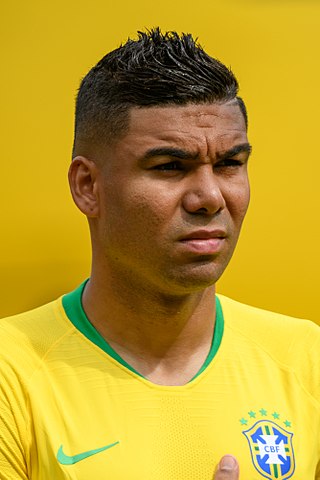
Carlos Henrique Casimiro, also known mononymously as Casemiro, is a Brazilian professional footballer who plays as a defensive midfielder for Premier League club Manchester United and the Brazil national team. Regarded as one of the best defensive midfielders of his generation, he is known for his defensive abilities, ball-winning skills, and tackling during his time at Real Madrid.

Lucas Rodrigues Moura da Silva, known as Lucas Moura, is a Brazilian professional footballer who plays as a right winger and centre-forward for Campeonato Brasileiro Série A club São Paulo and the Brazil national team.
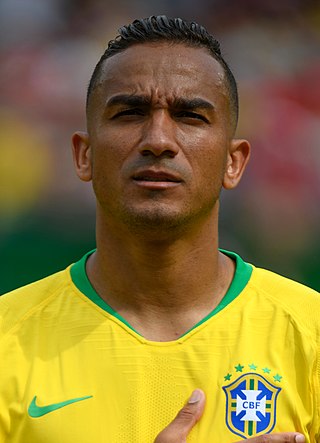
Danilo Luiz da Silva, known as Danilo, is a Brazilian professional footballer who plays as a centre-back or right-back for and captains both Serie A club Juventus and the Brazil national team.
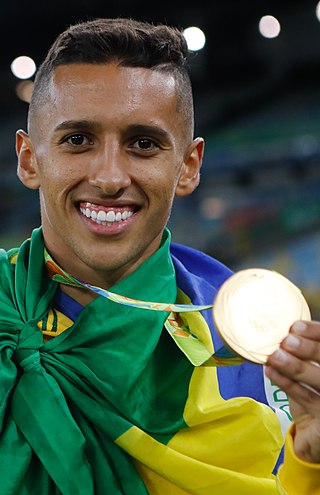
Marcos Aoás Corrêa, better known as Marquinhos, is a Brazilian professional footballer who plays as a centre-back for Ligue 1 club Paris Saint-Germain, which he captains, and the Brazil national team.
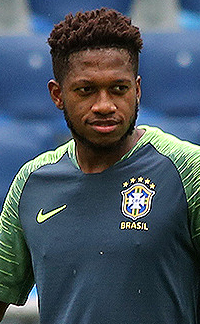
Frederico Rodrigues de Paula Santos, known as Fred, is a Brazilian professional footballer who plays as a midfielder for Süper Lig club Fenerbahçe and the Brazil national team.

Gabriela Braga Guimarães, also known by her nickname Gabi, is a Brazilian professional indoor volleyball player. She plays as an outside hitter. She competed at the 2020 Summer Olympics and 2024 Summer Olympics, winning a silver medal in Tokyo and a bronze medal in Paris.

Álisson Ramsés Becker, better known as Alisson Becker or simply Alisson, is a Brazilian professional footballer who plays as a goalkeeper for Premier League club Liverpool and the Brazil national team. Regarded as one of the best goalkeepers in the world, he is known for his positioning, distribution, and ability in one-on-one situations.


















